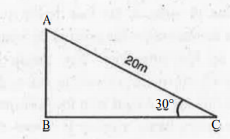Without actually performing the long division , state whether the following rational numbers will have a terminating decimal expansion or a non-terminating repeating decimal expansion : 17/8Solution in Punjabi
The correct Answer is:non-terminating decimal expansion
Step by step video, text & image solution for Without actually performing the long division , state whether the following rational numbers will have a terminating decimal expansion or a non-terminating repeating decimal expansion : 17/8 by Maths experts to help you in doubts & scoring excellent marks in Class 10 exams.
Topper's Solved these Questions
- BOOK - SWAN PUBLICATIONCHAPTER - REAL NUMBERSEXERCISE - Exercise 1.35videos
REAL NUMBERS
- BOOK - SWAN PUBLICATIONCHAPTER - QUADRATIC EQUATIONSEXERCISE - EXERCISE 4.48videos
QUADRATIC EQUATIONS
- BOOK - SWAN PUBLICATIONCHAPTER - Some Applications of TrigonometryEXERCISE - EXERCISE 9.114videos
Some Applications of Trigonometry
Similar Questions
Prove that√5+1 is irrational.
01:27View SolutionFind the nature of the roots of the following quadratic equations. If the real roots exist, find them :- 2x2−3x+5=0 .
01:11View SolutionA circus artist is climbing a 20m long rope, which is tightly stretched and tied from the top of a vertical pole to the ground. Find the height of the pole, if the angle made by the rope with the ground level is 30∘ (see fig.).
 03:21View Solution
03:21View SolutionWithout actually performing the long division, state whether the following rational numbers will have terminating decimal expansion or a non-terminating repeating decimal expansion. Also, find the number of places of decimals after which the decimal expansion terminates. 178 (ii) 64455 (iii) 29343
01:57View SolutionWithout actually performing the long division, state whether the following rational numbers will have terminating decimal expansion or a non-terminating repeating decimal expansion. Also, find the number of places of decimals after which the decimal expansion terminates. 15600 (ii) 133125 (iii) 232352
02:08View SolutionWithout actual performing the long division fine if 39510500 will have terminating or non terminating (repeating decimal expansion).
02:27View SolutionWithout actually performing the long division. State whether the rational number 84455 will have terminating decimal expansion on a non-terminating repeating decimal expansion .
02:38View SolutionWithout actually performing the long division state whether the following rational numbers will have a terminating decimal expansion or a non-terminating repeating decimal expansion
17804:21View SolutionWithout actually performing the long division state whether the following rational numbers will have a terminating decimal expansion or a non-terminating repeating decimal expansion
15160005:27View SolutionWithout actually performing the long division state whether the following rational numbers will have a terminating decimal expansion or a non-terminating repeating decimal expansion
61503:57View SolutionWithout actually performing the long division, state whether the following rational numbers will have terminating decimal expansion or a non-terminating repeating decimal expansion. Also, find the number of places of decimals after which the decimal expansion terminates. 178 (ii) 64455 (iii) 29343
01:12View SolutionWithout actually performing the long division, state whether the following rational numbers will have terminating decimal expansion or a non-terminating repeating decimal expansion. Also, find the number of places of decimals after which the decimal expansion terminates. 15600 (ii) 133125 (iii) 232352
01:50View SolutionWithout actually performing the long division, state whether the rational number will have a terminating decimal expansion or a non - terminating repeating decimal expansion
13312501:56View SolutionWithout actually performing the long division, state whether the rational number will have a terminating decimal expansion or a non - terminating repeating decimal expansion
17801:35View SolutionWithout actually performing the long division, state whether the rational number will have a terminating decimal expansion or a non - terminating repeating decimal expansion
6445501:15View SolutionWithout actually performing the long division, state whether the rational number will have a terminating decimal expansion or a non - terminating repeating decimal expansion
15160001:29View Solution

